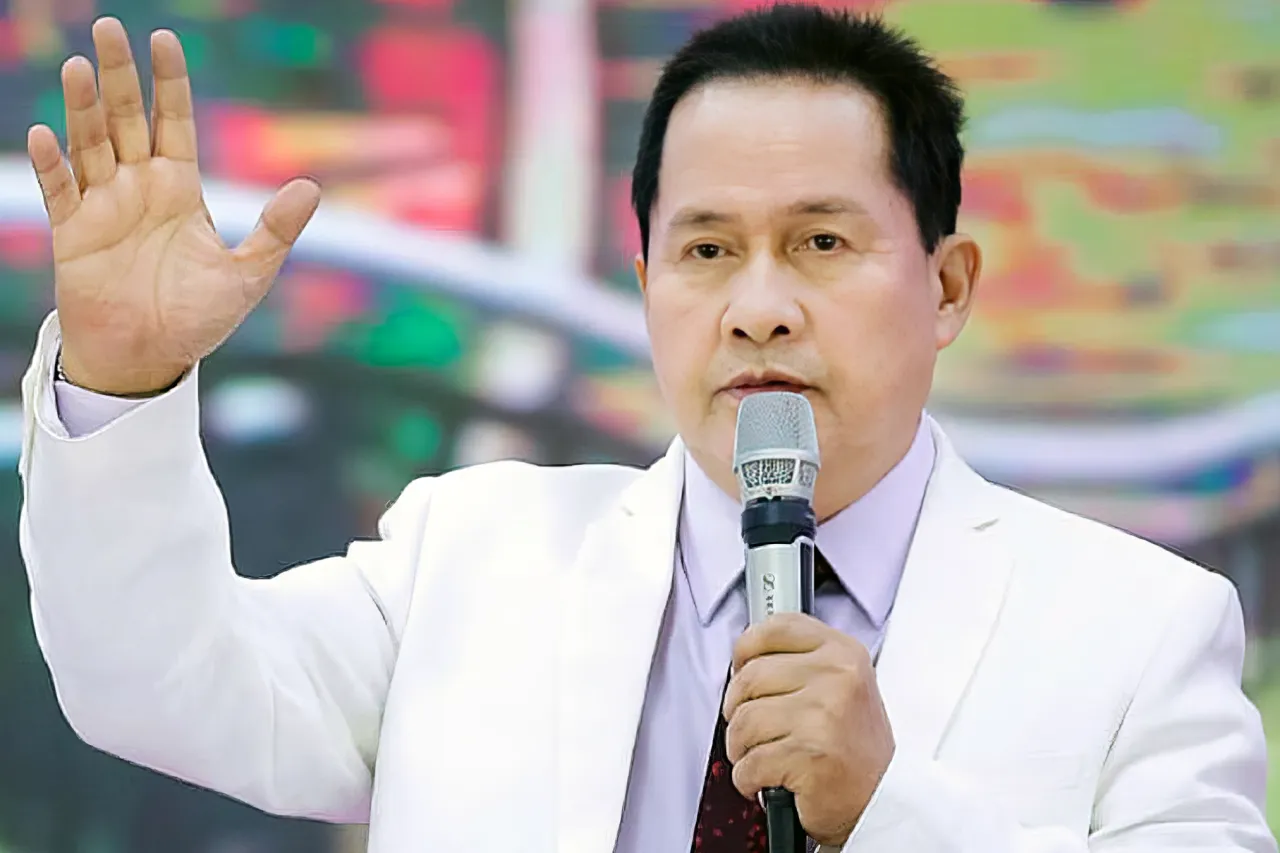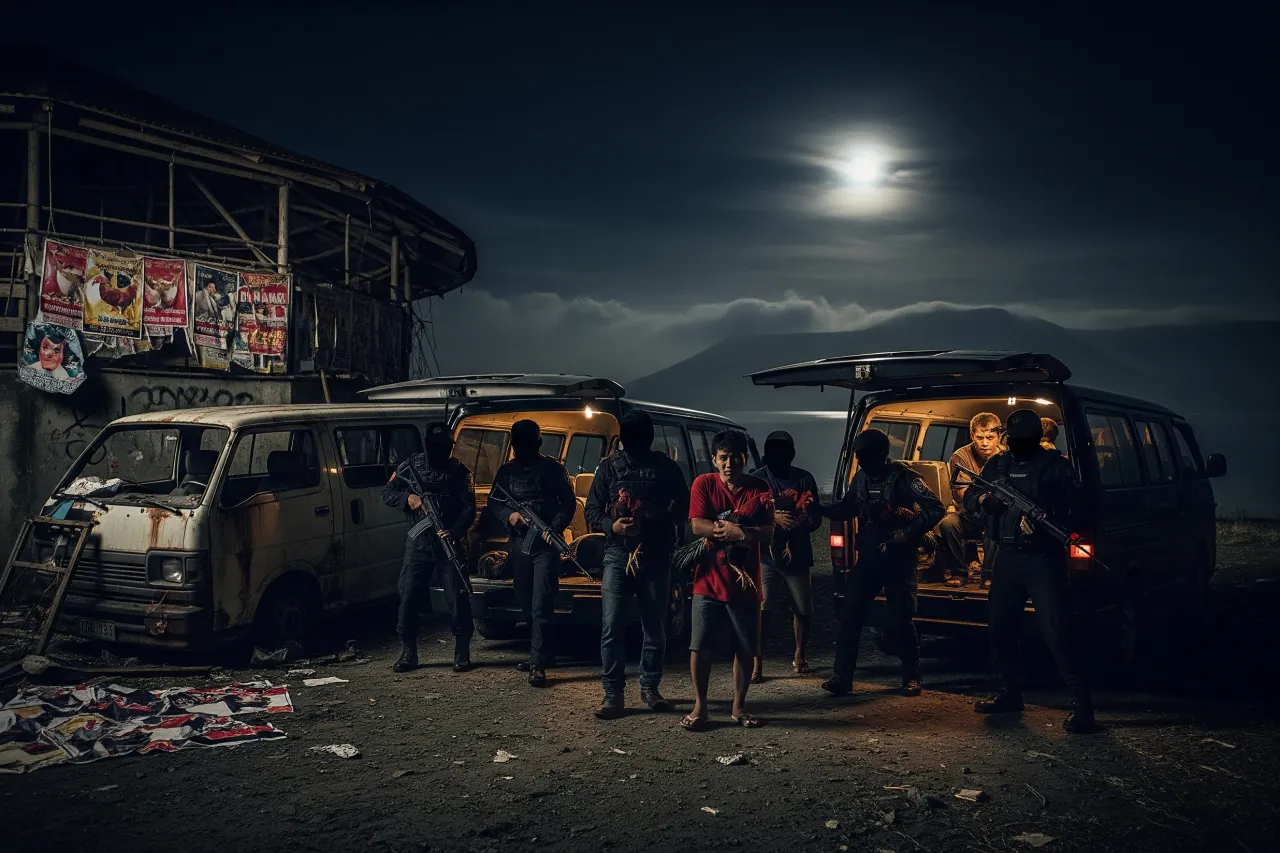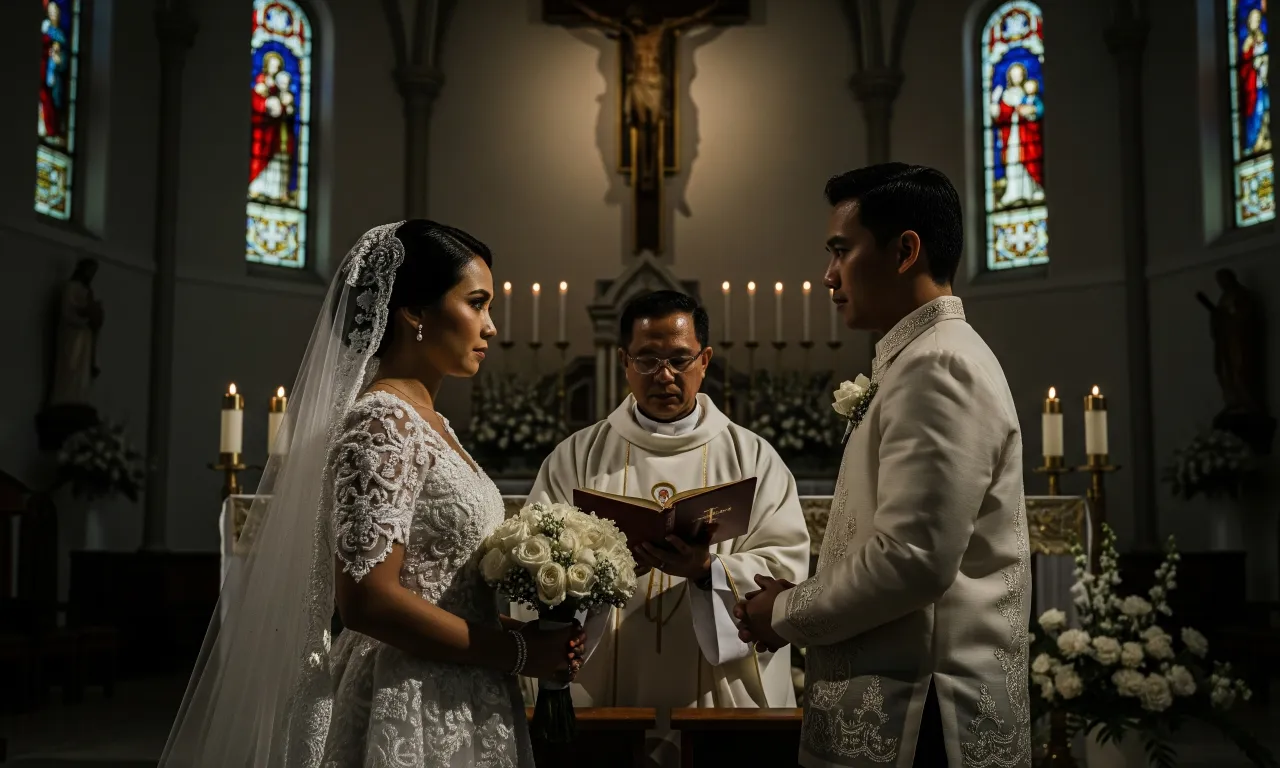Section 1: Genesis of a Kingdom
The Making of a Pastor
The story of Apollo Carreon Quiboloy begins not in a celestial realm, but in the terrestrial reality of post-war Davao City. Born on April 25, 1950, to Kapampangan parents who had migrated south in search of opportunity, Quiboloy was the youngest of nine children. His family was deeply embedded in the nascent Pentecostal movement in the region, with his father and brothers serving as pastor-leaders for the United Pentecostal Church of the Philippines (UPCP). This environment steeped the young Quiboloy in a world of charismatic preaching and spiritual fervor.
- Section 1: Genesis of a Kingdom
- Section 2: The Empire of Faith and Finance
- Section 3: The Unholy Alliance: Politics, Power, and Impunity
- Section 4: The Fall from Grace: Allegations and Indictments
- Section 5: The Manhunt and the Standoff
- Section 6: The Reckoning (Status as of August 2025)
- Conclusion: A Kingdom in Question
Though he initially harbored ambitions of becoming a nautical engineer, the practical benefits of theological study—including free tuition, board, and lodging—led him to the United Pentecostal Bible Institute, where he graduated in 1972. His talent for oratory quickly earned him the moniker “Preaching Machine” within the UPCP, and by 1973, he was representing the church at international conferences. However, his tenure within the established church structure was fraught with conflict. He was first expelled in 1979 for “unorthodox teachings,” and though he was reinstated a year later, by 1985 he was once again under investigation for what the UPCP termed “arrogant attitudes” towards his peers.
Rather than submit to the church’s disciplinary process, Quiboloy chose schism. On September 1, 1985, he broke away from the UPCP, taking with him a small flock of 15 followers. In the impoverished slums of Villamor, Agdao, he founded his own church: the Kingdom of Jesus Christ, The Name Above Every Name (KOJC). It was here, away from the oversight of any established religious body, that he began to cultivate a new, radical theology with himself at its absolute center.
The Doctrine of Divine Appointment
The theological bedrock of the KOJC, and the primary mechanism of Quiboloy’s power, is the doctrine of his own divinity. He proclaimed himself the “Appointed Son of God,” a title that fundamentally reconfigured the relationship between leader and follower. This was not the claim of a prophet acting as a mere messenger for a higher power; it was the assertion of being a divine entity in his own right, the sole gatekeeper of salvation for a new generation.
This doctrine aligns closely with the psychological frameworks that define cults. According to psychiatrist Robert Jay Lifton, a key characteristic of such groups is the presence of a charismatic leader who becomes an object of worship, operating beyond accountability and serving as the singular source of truth and authority for the group. By declaring himself the “Appointed Son of God,” Quiboloy established a closed ideological system where his word was law, and his desires were framed as divine will. This created an environment of extreme psychological coercion. For his followers, obedience was not merely a matter of church discipline but a prerequisite for eternal salvation. Conversely, any form of dissent, questioning, or resistance was reframed as a spiritual failing, a sin that carried the ultimate threat: “eternal damnation”.
This theological construct is the key to understanding the subsequent allegations of systemic abuse. It provided the justification for absolute control, transforming exploitation into a holy duty. The alleged sexual abuse of female followers, referred to as “night duty,” was presented not as a crime but as a sacred act of surrendering one’s body to “God’s will” as embodied by Quiboloy. The demand for followers to surrender all their financial assets and labor for the church’s benefit was framed as a necessary sacrifice for the Kingdom. The doctrine of divine appointment was, therefore, more than a religious belief; it was the foundational instrument of control that enabled a sprawling enterprise of alleged human trafficking and abuse.
Section 2: The Empire of Faith and Finance
The Media Arm: Sonshine Media Network International (SMNI)
To project his influence beyond the walls of his Davao compound, Quiboloy built a sophisticated media empire, Sonshine Media Network International (SMNI). Legally, SMNI is operated by Swara Sug Media Corporation (SSMC), a company that is 99.68% owned by the KOJC’s corporate sole, with Quiboloy himself serving as founder and honorary chairman. This ownership structure ensures that the network functions not as an independent news organization but as a direct extension of Quiboloy’s will and the church’s agenda.
SMNI became a powerful tool for political and ideological warfare. It provided a loyal platform for Quiboloy’s political allies, most notably former President Rodrigo Duterte and later the “Uniteam” ticket of Ferdinand Marcos Jr. and Sara Duterte in the 2022 elections. This access to a national broadcast network granted Quiboloy immense political capital, allowing him to position himself as a kingmaker.
More insidiously, SMNI was allegedly weaponized to attack critics of Quiboloy and his political allies. The network became notorious for “red-tagging”—the practice of accusing journalists, activists, and political opponents of being communists or terrorists, a tactic that has been shown to precede harassment and violence in the Philippines. This aligns with established disinformation strategies, such as creating fake personas (presenting propaganda as news) and flooding the information environment to drown out opposing viewpoints. SMNI was not merely a business; it was an integrated apparatus of power that manufactured influence, provided a platform for political protectors, and systematically attacked perceived enemies, creating a self-reinforcing cycle of impunity. In March 2024, the Philippine House of Representatives voted to revoke SMNI’s franchise, citing violations that included the deliberate dissemination of false information.
The Financial Engine: Forced Solicitation and Fraud
The U.S. federal indictment unsealed in November 2021 lays bare the alleged financial engine that fueled Quiboloy’s empire. The indictment describes a vast international labor trafficking scheme built on the exploitation of church members, known as “Full-Time Workers” (FTWs).
According to prosecutors, these workers were brought to the United States on fraudulently obtained visas, often under the pretense that they were traveling for religious performances. Upon arrival, their passports and identification documents were allegedly confiscated, rendering them powerless and dependent on the church administrators. They were then forced to work long hours soliciting donations on the streets of major American cities.
The solicitations were conducted under the banner of a bogus charity, the Children’s Joy Foundation, which claimed to be raising funds for impoverished children in the Philippines. However, the indictment alleges that “most or all of the raised money” was funneled back to the KOJC to finance the “lavish lifestyles” of Quiboloy and his top administrators. This lifestyle reportedly included a fleet of private jets, luxury vehicles, and sprawling properties in Calabasas, California; Las Vegas, Nevada; and Kapolei, Hawaii.
The methods for moving the money were allegedly as illicit as the means of acquiring it. The indictment details charges of bulk cash smuggling, with prosecutors claiming that large sums of undeclared cash were transported back to the Philippines on Quiboloy’s private jet, sometimes hidden in socks. Workers who proved to be particularly successful fundraisers were allegedly forced into sham marriages or enrolled under fraudulent student visas to prolong their stay in the U.S. and continue their solicitation activities. This systematic operation, spanning years and continents, allegedly generated millions of dollars, forming the financial bedrock of Quiboloy’s self-proclaimed kingdom.
Section 3: The Unholy Alliance: Politics, Power, and Impunity
The Kingmaker and the President
The rise and persistence of Apollo Quiboloy cannot be understood without examining his deep, symbiotic relationship with former Philippine President Rodrigo Duterte. For over three decades, the two men, both hailing from Davao City, cultivated a powerful alliance. Quiboloy served as Duterte’s “spiritual adviser,” a role that lent a veneer of divine sanction to Duterte’s often brutal political agenda.
During the 2016 presidential campaign, Quiboloy’s support was tangible and invaluable. He lent his private jet and helicopter to Duterte, allowing the then-mayor to traverse the archipelago and reach far-flung communities. He also delivered the crucial endorsement of his millions of followers, a significant voting bloc in a tightly contested election. In return, Duterte’s presidency provided Quiboloy with an unprecedented shield of impunity. With his closest ally in the presidential palace, Quiboloy operated with apparent immunity from scrutiny, both from law enforcement and political bodies.
The depth of their bond was starkly illustrated after Quiboloy became a fugitive. In a move that stunned legal and political observers, Duterte was appointed the administrator of the KOJC’s vast assets. Duterte himself stated that he offered to take on the role out of a “debt of gratitude,” raising profound questions about conflicts of interest and the potential for the former president to obstruct justice or facilitate money laundering on behalf of his wanted friend. This intricate knot of personal loyalty, political power, and financial interest created a protective barrier that allowed Quiboloy’s alleged criminal enterprise to flourish for years.
A Culture of Impunity
Quiboloy’s ability to evade accountability for decades is not merely the story of one powerful man. It is a stark symptom of a deeper, systemic culture of impunity that pervades the Philippine justice system. To fully grasp the environment that enabled him, one need only look at a parallel case that unfolded during the same period: the mass disappearance of at least 34 cockfighting enthusiasts, or sabungeros, between 2021 and 2022.
The sabungeros case provides a chilling macro-level example of the systemic failures that protected Quiboloy. The disappearances were widespread, spanning multiple provinces in Luzon, and were allegedly orchestrated by powerful figures within the lucrative online cockfighting (e-sabong) industry. Most disturbingly, the investigation has revealed the alleged complicity of numerous active-duty police officers, who were purportedly hired as mercenaries to carry out the abductions and killings. Despite whistleblower testimonies, CCTV evidence, and a Senate investigation, the path to justice for the victims’ families has been agonizingly slow, marked by delays and a palpable fear of retribution.
This climate of impunity was exacerbated and normalized during the Duterte administration’s “war on drugs.” The campaign, which resulted in thousands of extrajudicial killings, systematically weakened institutions of accountability and fostered an environment where state actors could operate outside the rule of law without consequence. Quiboloy’s alliance with Duterte placed him at the very heart of this system. He was not simply a beneficiary of a broken system; he was a partner to its chief architect. His alleged crimes, though different in nature, were shielded by the same political and judicial rot that allowed the sabungeros to vanish and the victims of the drug war to be killed without recourse. The Quiboloy saga is not an anomaly; it is the logical and perhaps inevitable outcome of a nation grappling with a deep-seated crisis of accountability.
Section 4: The Fall from Grace: Allegations and Indictments
Testimonies of Abuse
The wall of silence around the KOJC began to crumble in earnest in early 2024, when the Philippine Senate Committee on Women, Children, Family Relations and Gender Equality, chaired by Senator Risa Hontiveros, opened a public inquiry into the church. Former members, some speaking from overseas via video link, came forward with harrowing testimonies of abuse.
Witnesses, including Ukrainian nationals identified as “Sofia” and “Nina,” alleged a system of sexual exploitation centered around the concept of “night duty.” They testified that they were coerced into performing sexual acts with Quiboloy, with compliance framed as a religious obligation and refusal met with threats of “eternal damnation”. Other former members described a regime of brutal physical punishment for those deemed to be “Serpent’s Seeds,” or erring members. A witness identified as “Jerome” alleged that punishments included being forced to bash their heads against a wall until they bled or having chili peppers rubbed into their eyes and private parts.
The testimonies also corroborated the financial exploitation scheme detailed in the U.S. indictment. Arlene Stone, a former member, testified that she was trafficked from Mindanao to Manila as a minor and forced to sell merchandise to raise money for the church. These accounts painted a consistent and disturbing picture of a closed, totalitarian system where spiritual devotion was allegedly used as a tool for sexual, physical, and financial exploitation.
The Legal Onslaught
The public testimonies were accompanied by a multi-front legal assault that cornered Quiboloy in both the Philippines and the United States.
- In the Philippines: On March 19, 2024, the Department of Justice (DOJ) announced the filing of formal charges against Quiboloy and several of his associates. In the Davao City Regional Trial Court, he was charged with violations of Republic Act 7610, the Special Protection of Children Against Abuse, Exploitation, and Discrimination Act. In the Pasig City Regional Trial Court, he faced the more serious, non-bailable charge of Qualified Human Trafficking under Republic Act 9208.
- In the United States: Quiboloy was already the subject of a superseding federal indictment unsealed in November 2021 by a grand jury in the Central District of California. The charges were extensive and detailed the international scope of his alleged criminal enterprise. They included Conspiracy to Engage in Sex Trafficking by Force, Fraud and Coercion; Sex Trafficking of Children; Conspiracy; and Bulk Cash Smuggling. This indictment led the Federal Bureau of Investigation (FBI) to place Quiboloy on its “Most Wanted” list, elevating his case to a matter of international law enforcement priority.
The dual legal battles in two different countries ensured that Quiboloy could no longer rely on his political connections in the Philippines to shield him from the law. The charges represented a comprehensive indictment of nearly every aspect of his operation, from his personal conduct to the financial foundations of his global church.
Table 1: Timeline of Key Events in the Apollo Quiboloy Case (1985-2025)
| Date | Event | Significance |
| Sep 1, 1985 | Apollo Quiboloy founds the Kingdom of Jesus Christ (KOJC) in Davao City after breaking away from the UPCP. | Marks the beginning of his independent religious movement and the establishment of his absolute authority. |
| Nov 10, 2021 | A U.S. federal grand jury in California returns a superseding indictment against Quiboloy for sex trafficking and other crimes. | The legal case against him becomes international, culminating in an FBI arrest warrant. |
| Jan 23, 2024 | The Philippine Senate, led by Sen. Risa Hontiveros, begins its public inquiry into alleged abuses within the KOJC. | Former members provide public, on-the-record testimony, detailing allegations of sexual, physical, and financial abuse. |
| Mar 19, 2024 | The Philippine Department of Justice (DOJ) files charges of child abuse and qualified human trafficking against Quiboloy in Davao and Pasig courts. | The domestic legal pressure intensifies, leading to the issuance of local arrest warrants. |
| Apr 2024 | Philippine courts issue warrants for Quiboloy’s arrest. He goes into hiding, claiming a U.S.-Philippine plot to assassinate him. | Quiboloy officially becomes a fugitive from Philippine law, triggering a nationwide manhunt. |
| Aug 24, 2024 | The Philippine National Police (PNP) begins a 16-day siege of the KOJC compound in Davao City to serve the arrest warrants. | A tense standoff ensues, marked by clashes between police and Quiboloy’s supporters. |
| Sep 8, 2024 | Apollo Quiboloy surrenders to authorities, ending the manhunt. | The fugitive pastor is taken into custody and flown to Manila. |
| Sep 13, 2024 | Quiboloy pleads “not guilty” to charges of child abuse and human trafficking during his arraignment in Manila. | The formal court proceedings in the Philippines officially begin. |
| Oct 8, 2024 | From his jail cell, Quiboloy files his certificate of candidacy for the 2025 Philippine Senate election. | A political maneuver to maintain influence and challenge the legitimacy of the cases against him. |
| Jul 21, 2025 | The Pasig Regional Trial Court junks Quiboloy’s petition for bail on the non-bailable human trafficking charge. | A significant legal setback, ensuring his continued detention as the trial proceeds. |
Section 5: The Manhunt and the Standoff
A Fugitive “Son of God”
With the walls of justice closing in, Apollo Quiboloy became a fugitive in his own country. Following the issuance of arrest warrants by the Pasig and Davao courts, as well as a contempt order from the Senate for his refusal to attend hearings, Quiboloy went into hiding in early 2024. From his undisclosed location, he released a 37-minute audio recording, not of repentance, but of defiance. He alleged a grand conspiracy, claiming that the U.S. government, in collusion with the administration of President Ferdinand Marcos Jr., was plotting to “eliminate” him through rendition or assassination.
His defiance triggered a nationwide manhunt. The Philippine government, facing pressure to enforce its own court orders, escalated its efforts. In July 2024, Interior Secretary Benhur Abalos announced a ₱10 million (approximately $170,000) reward for any information leading to Quiboloy’s capture, officially branding the “Appointed Son of God” as one of the country’s most high-profile fugitives.
The Siege of Glory Mountain
The manhunt culminated in a dramatic 16-day siege of the KOJC’s main compound in Davao City, a sprawling 75-acre property that includes a cathedral, a college, and a 75,000-seat stadium. The operation began in the pre-dawn hours of August 24, 2024, when a force of over 2,000 police officers from multiple regions surrounded the compound.
The standoff was a spectacle of modern policing and fervent devotion. Authorities deployed helicopters and advanced technology, including thermal imaging and seismic detectors, to search for signs of life in a suspected network of underground bunkers. On the ground, they were met by hundreds of Quiboloy’s followers, who formed human barricades, chanting and praying to obstruct the police’s entry. The situation grew tense, with intermittent clashes breaking out. On August 26, police forcibly dispersed a barricade, leading to the arrest of 18 KOJC members for obstruction of justice. One church member died of a heart attack during the initial raid, an incident his fellow followers attributed to the stress of the police operation.
The Capture
The standoff reached its climax on September 8, 2024. After weeks of fruitless searching and tense negotiations with Quiboloy’s lawyers, police issued a 24-hour ultimatum: surrender, or they would storm the building where he was believed to be hiding. Hours later, Quiboloy capitulated. His lawyers announced that he had “voluntarily surrendered” to the Intelligence Service of the Armed Forces of the Philippines. He was taken into custody, flown from Davao to Manila on a military C-130 aircraft, and presented to the media at the national police headquarters in Camp Crame. The manhunt was over.
Section 6: The Reckoning (Status as of August 2025)
Incarceration and Legal Battles
As of August 2025, Apollo Quiboloy remains incarcerated, his divine proclamations replaced by the stark reality of the Philippine penal system. He is primarily detained at the Pasig City Jail, facing the non-bailable charge of qualified human trafficking. His legal team’s petitions for house arrest or transfer to a military facility, citing security concerns and health issues, have been repeatedly denied by the courts.
The legal proceedings against him are moving forward, albeit slowly. In a significant decision to ensure a fair trial, the Philippine Supreme Court ordered the transfer of his child abuse cases from his stronghold in Davao City to Quezon City. The court cited the need to avoid “a miscarriage of justice,” acknowledging that Quiboloy’s immense influence in Davao could lead to “local biases” and prevent witnesses from testifying freely due to fear. At his arraignment on September 13, 2024, Quiboloy pleaded “not guilty” to all charges. A major blow to his defense came on July 21, 2025, when the Pasig Regional Trial Court formally denied his petition for bail, ensuring he will remain in detention for the duration of his human trafficking trial.
The Political Gambit
Even from behind bars, Quiboloy has continued to exert political pressure. In a move widely seen as an attempt to maintain relevance and challenge the legitimacy of the state’s case against him, he filed his certificate of candidacy for the 2025 Philippine Senate election in October 2024. While Philippine law does not disqualify a candidate unless they have a final conviction, the act of running for national office while detained on charges of child sex trafficking is an audacious political gambit. It draws on a local history of politicians successfully campaigning from jail, leveraging their incarceration to project an image of political persecution.
The Extradition Question
Looming over the domestic legal proceedings is the prospect of extradition to the United States. The Philippines and the U.S. are bound by a long-standing extradition treaty, making the legal mechanism for his transfer straightforward. However, the political reality is far more complex.
The administration of President Ferdinand Marcos Jr. has consistently articulated a “trial first” policy. Both the President and the Department of Justice have stated that Quiboloy must first face the charges against him in Philippine courts, and if convicted, serve his sentence before any extradition request from the U.S. will be granted. As of August 2025, the U.S. has not yet made a formal extradition request, likely waiting for the domestic legal process to advance.
This position is a delicate political balancing act. On one hand, it asserts Philippine judicial sovereignty over a high-profile national. On the other, it navigates the treacherous internal politics involving Quiboloy’s primary protector, the still-powerful Duterte family, with whom the Marcos administration has an increasingly fractured relationship. Acting too swiftly on a U.S. request could provoke the formidable Duterte political bloc, while refusing to act at all could strain relations with a key international ally. The ultimate decision on Quiboloy’s extradition will therefore serve as a critical barometer of the Marcos administration’s domestic political priorities and its geopolitical allegiances.
Table 2: Comparison of Charges: Philippines vs. United States
| Jurisdiction | Primary Charges | Legal Basis / Key Allegations | Status (as of Aug 2025) |
| Philippines | Qualified Human Trafficking | Republic Act 9208: Allegations of recruiting and exploiting members for forced labor and sexual servitude. | Ongoing trial in Pasig City RTC; Non-bailable. |
| Child Sexual Abuse & Maltreatment | Republic Act 7610: Based on testimonies of former members who were minors at the time of the alleged abuse. | Ongoing trial in Quezon City RTC; Bail granted for co-accused. | |
| United States | Conspiracy to Engage in Sex Trafficking by Force, Fraud & Coercion | 18 U.S.C. § 1594(c): Allegedly coercing girls and women into “night duty” (sex with Quiboloy) under threat of “eternal damnation”. | Federal arrest warrant issued; Quiboloy is on the FBI’s “Most Wanted” list. Trial postponed to Nov 2025. |
| Sex Trafficking of Children | 18 U.S.C. § 1591: Indictment names multiple victims who were minors when the alleged trafficking began. | Federal arrest warrant issued. | |
| Bulk Cash Smuggling | 31 U.S.C. § 5332: Allegations of transporting large amounts of undeclared cash from the U.S. to the Philippines via private jet. | Federal arrest warrant issued. | |
| Conspiracy, Marriage Fraud, Visa Fraud | 18 U.S.C. § 371, 8 U.S.C. § 1325(c), 18 U.S.C. § 1546: Allegedly operating a scheme to obtain fraudulent visas and arrange sham marriages to keep workers soliciting in the U.S.. | Federal arrest warrant issued. |
Conclusion: A Kingdom in Question
The saga of Apollo Quiboloy is a uniquely Filipino story, yet it resonates with universal themes of power, faith, and impunity. It is a case study in how a charismatic leader can build a kingdom on the foundations of radical theology, leveraging the devotion of followers to construct a formidable empire of media, finance, and political influence. For decades, this kingdom appeared unassailable, protected by a carefully cultivated doctrine of divinity and a pragmatic alliance with the highest levels of state power.
The fall of Quiboloy from a self-proclaimed “Son of God” to a federal fugitive and, ultimately, a detainee in a city jail, marks a critical juncture. His case tests the very limits of the culture of impunity that has long plagued the Philippines. The convergence of domestic legal action, spurred by the courageous testimonies of former members, and international pressure from the United States created a perfect storm that even his powerful political protectors could not fully contain.
As of 2025, Quiboloy’s kingdom is in question, its assets now administered by his most powerful ally, former President Duterte, and its future dependent on the outcomes of multiple, complex legal battles. His story serves as a stark reminder of the dangers inherent in the fusion of absolute spiritual authority and temporal power. It demonstrates how claims of divinity can be used to justify alleged crimes of exploitation and how political patronage can shield those crimes from scrutiny. The final chapters of Quiboloy’s story have yet to be written, but his case has already forced a national reckoning with the intricate and often dark connections between faith, politics, and the enduring struggle for justice.




